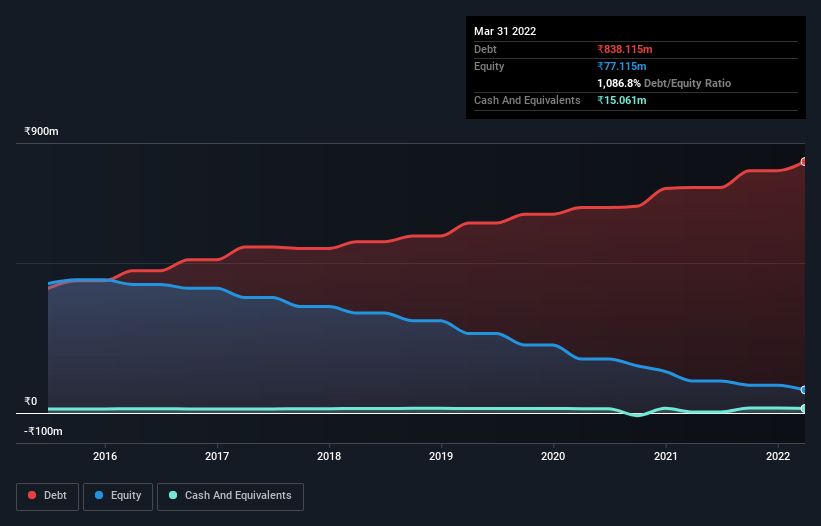Warren Buffett famously said, 'Volatility is far from synonymous with risk.' So it might be obvious that you need to consider debt, when you think about how risky any given stock is, because too much debt can sink a company. We can see that S. E. Power Limited (NSE:SEPOWER) does use debt in its business. But is this debt a concern to shareholders?
What Risk Does Debt Bring?
Debt is a tool to help businesses grow, but if a business is incapable of paying off its lenders, then it exists at their mercy. If things get really bad, the lenders can take control of the business. However, a more frequent (but still costly) occurrence is where a company must issue shares at bargain-basement prices, permanently diluting shareholders, just to shore up its balance sheet. Having said that, the most common situation is where a company manages its debt reasonably well - and to its own advantage. The first thing to do when considering how much debt a business uses is to look at its cash and debt together.
Check out our latest analysis for S. E. Power
What Is S. E. Power's Net Debt?
The image below, which you can click on for greater detail, shows that at March 2022 S. E. Power had debt of ₹838.1m, up from ₹751.5m in one year. Net debt is about the same, since the it doesn't have much cash.

A Look At S. E. Power's Liabilities
According to the last reported balance sheet, S. E. Power had liabilities of ₹95.6m due within 12 months, and liabilities of ₹782.4m due beyond 12 months. Offsetting this, it had ₹15.1m in cash and ₹100.1m in receivables that were due within 12 months. So its liabilities total ₹762.9m more than the combination of its cash and short-term receivables.
This is a mountain of leverage relative to its market capitalization of ₹1.02b. Should its lenders demand that it shore up the balance sheet, shareholders would likely face severe dilution. When analysing debt levels, the balance sheet is the obvious place to start. But you can't view debt in total isolation; since S. E. Power will need earnings to service that debt. So if you're keen to discover more about its earnings, it might be worth checking out this graph of its long term earnings trend.
In the last year S. E. Power wasn't profitable at an EBIT level, but managed to grow its revenue by 105%, to ₹487m. So its pretty obvious shareholders are hoping for more growth!
Caveat Emptor
While we can certainly appreciate S. E. Power's revenue growth, its earnings before interest and tax (EBIT) loss is not ideal. To be specific the EBIT loss came in at ₹7.7m. Considering that alongside the liabilities mentioned above does not give us much confidence that company should be using so much debt. So we think its balance sheet is a little strained, though not beyond repair. Another cause for caution is that is bled ₹42m in negative free cash flow over the last twelve months. So to be blunt we think it is risky. There's no doubt that we learn most about debt from the balance sheet. But ultimately, every company can contain risks that exist outside of the balance sheet. For example S. E. Power has 4 warning signs (and 2 which don't sit too well with us) we think you should know about.
When all is said and done, sometimes its easier to focus on companies that don't even need debt. Readers can access a list of growth stocks with zero net debt 100% free, right now.
New: Manage All Your Stock Portfolios in One Place
We've created the ultimate portfolio companion for stock investors, and it's free.
• Connect an unlimited number of Portfolios and see your total in one currency
• Be alerted to new Warning Signs or Risks via email or mobile
• Track the Fair Value of your stocks
Have feedback on this article? Concerned about the content? Get in touch with us directly. Alternatively, email editorial-team (at) simplywallst.com.
This article by Simply Wall St is general in nature. We provide commentary based on historical data and analyst forecasts only using an unbiased methodology and our articles are not intended to be financial advice. It does not constitute a recommendation to buy or sell any stock, and does not take account of your objectives, or your financial situation. We aim to bring you long-term focused analysis driven by fundamental data. Note that our analysis may not factor in the latest price-sensitive company announcements or qualitative material. Simply Wall St has no position in any stocks mentioned.
About NSEI:SAMPANN
Sampann Utpadan India
Manufactures and sells reclaimed rubber products in India.
Moderate risk and slightly overvalued.
Market Insights
Community Narratives




